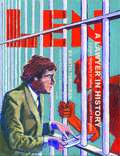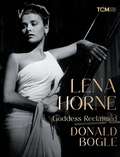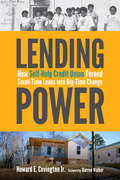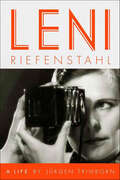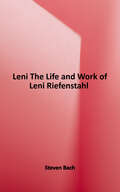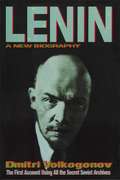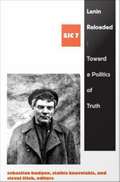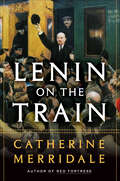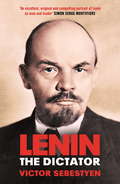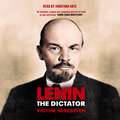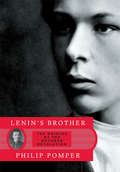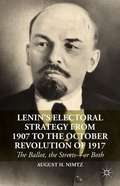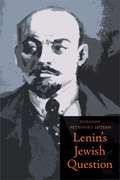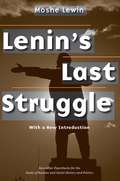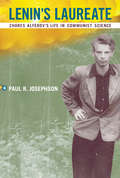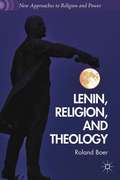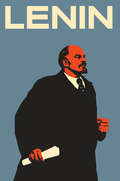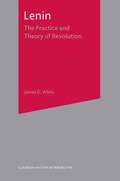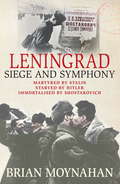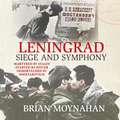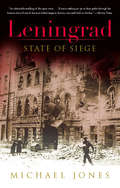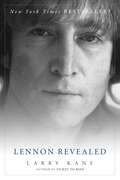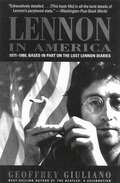- Table View
- List View
Len, A Lawyer in History: A Graphic Biography of Radical Attorney Leonard Weinglass
by Paul Buhle Seth Tobocman Michael Steven SmithFor half a century, criminal defense lawyer Leonard Weinglass defended a who's who of the twentieth-century left in some of America's most spectacular trials. "The typical call I get is one that starts by saying, 'You're the fifth attorney we've called,'" he once said. "Then I get interested." Those calls came from the likes of the SDS, the Chicago Seven, Daniel Ellsberg, Abbie Hoffman, and Mumia Abu-Jamal, among many others.In a field dominated by egomaniacs, Weinglass was known for his humility, his common touch, his ability to work collectively, his kindness, and his attention to detail. This long-overdue biography captures the vibrant life and inspiring legacy of an American iconoclast.Praise for Len, A Lawyer in History"For decades Seth Tobocman has been working within the comics vernacular to create a unique language, and with Len he's at the top of his game...brilliantly applying himself not only with pencil and ink on paper, but as an active participant in the same political struggles that Len Weinglass valiantly dedicated his life to solving." -Peter Kuper, author of Ruins"Tobocman has conjoined past and present to create singular, beautiful, volatile images of struggle.... At the center of this explosion-as example and harbinger, but most of all as an incendiary intimate portrait-stands Len himself. Our coalitions will forever be enriched by his presence, and by the demands his legacy bequeaths." -AK Thompson, author of Black Bloc, White Riot"I met Len Weinglass in 1964.... He was learned, funny, and the best damned trial lawyer I ever saw in a courtroom.... The chapters on Newark, Chicago, and the Pentagon Papers case will help a new generation understand the substance behind all the blurry labels about the time." -Tom Hayden, author of The Port Huron Statement "The book is dramatic in its reach and speechless in its words. It's not just about Len, but who we were as people during his journey. Remarkable." -Stanley L. Cohen, attorney and political activist"Len said: 'I would classify myself as radical American. I want to spend my time defending people who have committed their time to progressive social change.' This exemplifies how, along with Michael Ratner, William Kunstler, and other US lawyers around the Center for Constitutional Rights in New York, he was an incredibly important role model for radical human rights lawyers in Europe such as myself." -Wolfgang Kaleck, Secretary General, European Center for Constitutional and Human RightsPAUL BUHLE is the editor of a dozen comic art books along with many scholarly works, including the authorized biography of C.L.R. James.MICHAEL STEVEN SMITH is executor of Leonard Weinglass's estate and co-editor of Imagine: Living in a Socialist USA.SETH TOBOCMAN is an author/illustrator and one of the founding editors of World War 3 Illustrated.
Lena Horne: Goddess Reclaimed (Turner Classic Movies)
by Donald BogleFrom Donald Bogle, the award-winning author of Hollywood Black and leading authority on Black cinema history, this is a first-of-its-kind comprehensive and lavish biography of Hollywood&’s first African American movie goddess. Lena Horne&’s life and career are truly remarkable in American film history. She was the first Black performer to become a true star—to receive the kind of glamour treatment at the fabled MGM that the studio had previously given to the likes of Greta Garbo, Jean Harlow, Lana Turner, and Ava Gardner. At the same time, Horne dealt with endless indignities, not the least of which was the fact that her roles in films was often as a musical performer, which allowed her numbers to be easily stripped out of films without affecting the narrative when played to audiences that would find her presence undesirable. At long last, Lena Horne: Goddess Reclaimed gives the star her due. Through a highly informed and insightful narrative based on interviews, press accounts, studio archives, and decades of research, the book sheds new light on the star's compelling life and complicated career: her activism; her accomplishments and heady triumphs in movies, television, and nightclubs as she broke down long-standing barriers for Black individuals—especially Black women—and her solemn, sometimes bitter disappointments, both professional and personal. Illustrated by stunning photos (some published for the first time), this is the ultimate book on the icon.
Lending Power: How Self-Help Credit Union Turned Small-Time Loans into Big-Time Change
by Howard E. Covington Jr. Jr.Established by Martin Eakes and Bonnie Wright in North Carolina in 1980, the nonprofit Center for Community Self-Help has grown from an innovative financial institution dedicated to civil rights into the nation's largest home lender to low- and moderate-income borrowers. Self-Help's first capital campaign—a bake sale that raised a meager seventy-seven dollars for a credit union—may not have done much to fulfill the organization's early goals of promoting worker-owned businesses, but it was a crucial first step toward wielding inclusive lending as a weapon for economic justice. In Lending Power journalist and historian Howard E. Covington Jr. narrates the compelling story of Self-Help's founders and coworkers as they built a progressive and community-oriented financial institution. First established to assist workers displaced by closed furniture and textile mills, Self-Help created a credit union that expanded into providing home loans for those on the margins of the financial market, especially people of color and single mothers. Using its own lending record, Self-Help convinced commercial banks to follow suit, extending its influence well beyond North Carolina. In 1999 its efforts led to the first state law against predatory lending. A decade later, as the Great Recession ravaged the nation's economy, its legislative victories helped influence the Dodd-Frank Wall Street Reform and Consumer Protection Act and the formation of the Consumer Financial Protection Bureau. Self-Help also created a federally chartered credit union to expand to California and later to Illinois and Florida, where it assisted ailing community-based credit unions and financial institutions. Throughout its history, Self-Help has never wavered from its mission to use Dr. Martin Luther King Jr.'s vision of justice to extend economic opportunity to the nation's unbanked and underserved citizens. With nearly two billion dollars in assets, Self-Help also shows that such a model for nonprofits can be financially successful while serving the greater good. At a time when calls for economic justice are growing ever louder, Lending Power shows how hard-working and dedicated people can help improve their communities.
Leni Riefenstahl: A Life
by Jürgen TrimbornDancer, actress, mountaineer, and director Leni Riefenstahl's uncompromising will and audacious talent for self-promotion appeared unmatched—until 1932, when she introduced herself to her future protector and patron: Adolf Hitler. Known internationally for two of the films she made for him, Triumph of the Will and Olympia, Riefenstahl's demanding and obsessive style introduced unusual angles, new approaches to tracking shots, and highly symbolic montages. Despite her lifelong claim to be an apolitical artist, Riefenstahl's monumental and nationalistic vision of Germany's traditions and landscape served to idealize the cause of one of the world's most violent and racist regimes.Riefenstahl ardently cast herself as a passionate young director who caved to the pressure to serve an all-powerful Führer, so focused on reinventing the cinema that she didn't recognize the goals of the Third Reich until too late. Jürgen Trimborn's revelatory biography celebrates this charismatic and adventurous woman who lived to 101, while also taking on the myths surrounding her. With refreshing distance and detailed research, Trimborn presents the story of a stubborn and intimidating filmmaker who refused to be held accountable for her role in the Holocaust but continued to inspire countless photographers and filmmakers with her artistry.
Leni: The Life and Work of Leni Riefenstahl
by Steven BachLeni Riefenstahl, the woman known as “Hitler’s filmmaker,” made some of the greatest and most innovative documentaries ever made. They are also insidious glorifications of Adolf Hitler and the Third Reich. Now, Steven Bach reveals the truths and lies behind Riefenstahl’s lifelong self-vindication as an apolitical artist who claimed to know nothing of the Holocaust and denied her complicity with the criminal regime she both used and sanctified. <p><p>A riveting and illuminating biography of one of the most fascinating and controversial personalities of the twentieth century.
Lenin
by Dmitri VolkogonovThe special assistant to Boris Yeltsin radically alters the traditional image of Lenin with a biography based on secret Soviet archives, revealing the Founding Father as a cruel, totalitarian leader who was responsible for the worst excesses of the Soviet state.
Lenin Reloaded: Toward a Politics of Truth
by Slavoj I Ek Sebastian Budgen Stathis KouvelakisLenin Reloaded is a rallying call by some of the world's leading Marxist intellectuals for renewed attention to the significance of Vladimir Lenin. The volume's editors explain that it was Lenin who made Karl Marx's thought explicitly political, who extended it beyond the confines of Europe, who put it into practice. They contend that a focus on Lenin is urgently needed now, when global capitalism appears to be the only game in town, the liberal-democratic system seems to have been settled on as the optimal political organization of society, and it has become easier to imagine the end of the world than a modest change in the mode of production. Lenin retooled Marx's thought for specific historical conditions in 1914, and Lenin Reloaded urges a reinvention of the revolutionary project for the present. Such a project would be Leninist in its commitment to action based on truth and its acceptance of the consequences that follow from action. These essays, some of which are appearing in English for the first time, bring Lenin face-to-face with the problems of today, including war, imperialism, the imperative to build an intelligentsia of wage earners, the need to embrace the achievements of bourgeois society and modernity, and the widespread failure of social democracy. Lenin Reloaded demonstrates that truth and partisanship are not mutually exclusive as is often suggested. Quite the opposite--in the present, truth can be articulated only from a thoroughly partisan position. Contributors. Kevin B. Anderson, Alain Badiou, Etienne Balibar, Daniel Bensad, Sebastian Budgen, Alex Callinicos, Terry Eagleton, Fredric Jameson, Stathis Kouvelakis, Georges Labica, Sylvain Lazarus, Jean-Jacques Lecercle, Lars T. Lih, Domenico Losurdo, Savas Michael-Matsas, Antonio Negri, Alan Shandro, Slavoj Žižek
Lenin on the Train
by Catherine MerridaleOne of The Economist's Best Books of the YearA gripping, meticulously researched account of Lenin’s fateful 1917 rail journey from Zurich to Petrograd, where he ignited the Russian Revolution and forever changed the worldIn April 1917, as the Russian Tsar Nicholas II’s abdication sent shockwaves across war-torn Europe, the future leader of the Bolshevik revolution Vladimir Lenin was far away, exiled in Zurich. When the news reached him, Lenin immediately resolved to return to Petrograd and lead the revolt. But to get there, he would have to cross Germany, which meant accepting help from the deadliest of Russia’s adversaries. Millions of Russians at home were suffering as a result of German aggression, and to accept German aid—or even safe passage—would be to betray his homeland. Germany, for its part, saw an opportunity to further destabilize Russia by allowing Lenin and his small group of revolutionaries to return. Now, in Lenin on the Train, drawing on a dazzling array of sources and never-before-seen archival material, renowned historian Catherine Merridale provides a riveting, nuanced account of this enormously consequential journey—the train ride that changed the world—as well as the underground conspiracy and subterfuge that went into making it happen. Writing with the same insight and formidable intelligence that distinguished her earlier works, she brings to life a world of counter-espionage and intrigue, wartime desperation, illicit finance, and misguided utopianism. When Lenin arrived in Petrograd’s now-famous Finland Station, he delivered an explosive address to the impassioned crowds. Simple and extreme, the text of this speech has been compared to such momentous documents as Constantine’s edict of Milan and Martin Luther’s ninety-five theses. It was the moment when the Russian revolution became Soviet, the genesis of a system of tyranny and faith that changed the course of Russia’s history forever and transformed the international political climate.
Lenin the Dictator
by Victor Sebestyen'A fresh, powerful portrait of Lenin' Anne Applebaum, author of Red Famine'Richly readable ... An enthralling but appalling story' Francis Wheen, author of Karl MarxThe cold, one-dimensional figure of Lenin the political fanatic is only a partial truth. Drawing on extensive material that has only recently become available, Sebestyen's gripping biography casts an intriguing new light on the character behind the politics.In reality, Lenin was a man who loved nature as much as he loved making revolution, and his closest relationships were with women. He built a state based on terror. But he was a highly emotional man given to furious rages and deep passions. While never ignoring the politics, Sebestyen examines Lenin's inner life, his relationship with his wife and his long love affair with Inessa Armand, the most romantic and beguiling of Bolsheviks. These two women were as significant as the men - Stalin or Trotsky - who created the world's first Communist state with him.
Lenin the Dictator
by Victor SebestyenVictor Sebestyen's intimate biography is the first major work in English for nearly two decades on one of the most significant figures of the twentieth century. In Russia to this day Lenin inspires adulation. Everywhere, he continues to fascinate as a man who made history, and who created a new kind of state that would later be imitated by nearly half the countries in the world.Lenin believed that the 'the political is the personal', and while in no way ignoring his political life, Sebestyen's focus will be on Lenin the man - a man who loved nature almost as much as he loved making revolution, and whose closest ties and friendships were with women. The long-suppressed story of his ménage a trois with his wife, Nadezhda Krupskaya, and his mistress and comrade, Inessa Armand, reveals a different character to the coldly one-dimensional figure of legend.Told through the prism of Lenin's key relationships, Sebestyen's lively biography casts a new light the Russian Revolution, one of the great turning points of modern history.Read by Jonathan Aris(p) 2017 Orion Publishing Group Ltd
Lenin the Dictator: The Man, The Dictator, And The Master Of Terror
by Victor Sebestyen'A fresh, powerful portrait of Lenin' Anne Applebaum, author of Red Famine'Richly readable ... An enthralling but appalling story' Francis Wheen, author of Karl MarxThe cold, one-dimensional figure of Lenin the political fanatic is only a partial truth. Drawing on extensive material that has only recently become available, Sebestyen's gripping biography casts an intriguing new light on the character behind the politics.In reality, Lenin was a man who loved nature as much as he loved making revolution, and his closest relationships were with women. He built a state based on terror. But he was a highly emotional man given to furious rages and deep passions. While never ignoring the politics, Sebestyen examines Lenin's inner life, his relationship with his wife and his long love affair with Inessa Armand, the most romantic and beguiling of Bolsheviks. These two women were as significant as the men - Stalin or Trotsky - who created the world's first Communist state with him.
Lenin's Brother: The Origins of the October Revolution
by Philip PomperThe gripping untold story of a terrorist leader whose death would catapult his brother--Lenin--to revolution. In 1886, Alexander Ulyanov, a brilliant biology student, joined a small group of students at St. Petersburg University to plot the assassination of Russia's tsar. Known as "Second First March" for the date of their action, this group failed disastrously in their mission, and its leaders, Alexander included, were executed. History has largely forgotten Alexander, but for the most important consequence of his execution: his younger brother, Vladimir, went on to lead the October Revolution of 1917 and head the new Soviet government under his revolutionary pseudonym "Lenin." Probing the Ulyanov family archives, historian Philip Pomper uncovers Alexander's transformation from ascetic student to terrorist, and the impact his fate had on Lenin. Vividly portraying the psychological dynamics of a family that would change history, Lenin's Brother is a perspective-changing glimpse into Lenin's formative years--and his subsequent behavior as a revolutionary.
Lenin's Electoral Strategy from 1907 to the October Revolution of 1917: The Ballot, the Streets--or Both
by August H. NimtzThis book is the first full-length study of Lenin's party building project and writings on elections, looking in detail at his leadership of the Bolshevik wing of the Russian Social Democratic Labor Party in the four state Dumas from 1906 to the beginning of the First World War.
Lenin's Jewish Question
by Yohanan Petrovsky-ShternIn this first examination of Lenin’s genealogical and political connections to East European Jews, Yohanan Petrovsky-Shtern reveals the broad cultural meanings of indisputable evidence that Lenin’s maternal grandfather was a Jew. He examines why and how Lenin’s Jewish relatives converted to Christianity, explains how Lenin’s vision of Russian Marxism shaped his identity, and explores Lenin’s treatment of party colleagues of Jewish origin and the Jewish Question in Europe. Petrovsky-Shtern also uncovers the continuous efforts of the Soviet communists to suppress Lenin’s Jewishness and the no less persistent attempts of Russian extremists to portray Lenin as a Jew. In this fascinating book, Petrovsky-Shtern expands our understanding not only of Lenin, but also of Russian and Soviet handling of the Jewish Question.
Lenin's Last Struggle
by Moshe LewinOne of the great political strategists of his era, V. I. Lenin continues to attract historical interest, yet his complex personality eludes full understanding. This new edition of Moshe Lewin's classic political biography, including an afterword by the author, suggests new approaches for studying the Marxist visionary and founder of the Soviet state. Lenin's Last Struggle offers invaluable insights into the rise of the Bolshevik party and the Soviet Union, a saga complicated by complex strategic battles among the leaders of Lenin's generation: leaders whose names are universally known, but whose personalities and motivations are even now not sufficiently understood.
Lenin's Laureate: Zhores Alferov's Life in Communist Science (Transformations: Studies in the History of Science and Technology)
by Paul R. JosephsonThe life and work of a leading Soviet physicist and an exploration of the strengths and weaknesses of Soviet science from Stalin through Gorbachev.In 2000, Russian scientist Zhores Alferov shared the Nobel Prize for Physics for his discovery of the heterojunction, a semiconductor device the practical applications of which include LEDs, rapid transistors, and the microchip. The Prize was the culmination of a career in Soviet science that spanned the eras of Stalin, Khrushchev, and Gorbachev—and continues today in the postcommunist Russia of Putin and Medvedev. In Lenin's Laureate, historian Paul Josephson tells the story of Alferov's life and work and examines the bureaucratic, economic, and ideological obstacles to doing state-sponsored scientific research in the Soviet Union. Lenin and the Bolsheviks built strong institutions for scientific research, rectifying years of neglect under the Czars. Later generations of scientists, including Alferov and his colleagues, reaped the benefits, achieving important breakthroughs: the first nuclear reactor for civilian energy, an early fusion device, and, of course, the Sputnik satellite. Josephson's account of Alferov's career reveals the strengths and weaknesses of Soviet science—a schizophrenic environment of cutting-edge research and political interference. Alferov, born into a family of Communist loyalists, joined the party in 1967. He supported Gorbachev's reforms in the 1980s, but later became frustrated by the recession-plagued postcommunist state's failure to fund scientific research adequately. An elected member of the Russian parliament since 1995, he uses his prestige as a Nobel laureate to protect Russian science from further cutbacks.Drawing on extensive archival research and the author's own discussions with Alferov, Lenin's Laureate offers a unique account of Soviet science, presented against the backdrop of the USSR's turbulent history from the revolution through perestroika.
Lenin, Religion, and Theology
by Roland BoerBased on a careful reading of Lenin's Collected Works, Roland Boer pursues the implications for linking Lenin with religion and theology and seeks to bring Lenin into recent debates over the intersections between theology and the Left, between the Bible and political thought.
Lenin: The Man, the Dictator, and the Master of Terror
by Victor SebestyenVictor Sebestyen's riveting biography of Vladimir Ilyich Lenin—the first major biography in English in nearly two decades—is not only a political examination of one of the most important historical figures of the twentieth century but also a fascinating portrait of Lenin the man.Brought up in comfort and with a passion for hunting and fishing, chess, and the English classics, Lenin was radicalized after the execution of his brother in 1887. Sebestyen traces the story from Lenin's early years to his long exile in Europe and return to Petrograd in 1917 to lead the first Communist revolution in history. Uniquely, Sebestyen has discovered that throughout Lenin's life his closest relationships were with his mother, his sisters, his wife, and his mistress. The long-suppressed story told here of the love triangle that Lenin had with his wife, Nadezhda Krupskaya, and his beautiful, married mistress and comrade, Inessa Armand, reveals a more complicated character than that of the coldly one-dimensional leader of the Bolshevik Revolution.With Lenin's personal papers and those of other leading political figures now available, Sebestyen gives is new details that bring to life the dramatic and gripping story of how Lenin seized power in a coup and ran his revolutionary state. The product of a violent, tyrannical, and corrupt Russia, he chillingly authorized the deaths of thousands of people and created a system based on the idea that political terror against opponents was justified for a greater ideal. An old comrade what had once admired him said that Lenin "desired the good . . . but created evil." This included his invention of Stalin, who would take Lenin's system of the gulag and the secret police to horrifying new heights.In Lenin, Victor Sebestyen has written a brilliant portrait of this dictator as a complex and ruthless figure, and he also brings to light important new revelations about the Russian Revolution, a pivotal point in modern history.(With 16 pages of black-and-white photographs)
Lenin: The Practice and Theory of Revolution (European History In Perspective Ser.)
by James D. WhiteA political and intellectual biographical study of Lenin which focuses on those aspects of his thought and political activities that had a bearing on the accession of the Bolsheviks to power in Russia in 1917 and the creation of the Soviet state. The book places Lenin in the context of his times and shows his relationship to other socialist thinkers. In particular it locates Lenin within the development of Marxist thought in Russia. Its historiographical chapter reveals the political factors which influenced the way biographies of Lenin were written in the Soviet Union. The book makes extensive use of first-hand materials including sources from the Russian archives.
Leningrad: Siege and Symphony
by Brian MoynahanShostakovich's Seventh Symphony was first played in the city of its birth on 9 August, 1942. There has never been a first performance to match it. Pray God, there never will be again. Almost a year earlier, the Germans had begun their blockade of the city. Already many thousands had died of their wounds, the cold, and most of all, starvation. The assembled musicians - scrounged from frontline units and military bands, for only twenty of the orchestra's 100 players had survived - were so hungry, many feared they'd be too weak to play the score right through. In these, the darkest days of the Second World War, the music and the defiance it inspired provided a rare beacon of light for the watching world. Setting the composition of Shostakovich's most famous work against the tragic canvas of the siege itself and the years of repression and terror that preceded it, Leningrad: Siege and Symphony is a magisterial and moving account of one of the most tragic periods in history.
Leningrad: Siege and Symphony
by Brian MoynahanIn Leningrad: Siege and Symphony, Brian Moynahan sets the composition of Shostakovich's most famous work against the tragic canvas of the siege itself and the years of repression and terror that preceded it.Drawing on extensive primary research in archives as well as personal letters and diaries, he vividly tells the story of the cruelties heaped by the twin monsters of the 20th century, Stalin and Hitler, on a city of exquisite beauty, and of its no less remarkable survival.Weaving Shostakovich's own story and that of many others into the context of the maelstrom of Stalin's purges and the Nazis' brutal invasion of Russia, Leningrad: Siege and Symphony is a magisterial and moving account of one of the most tragic periods of the twentieth century. (P)2013 WF Howes Ltd
Leningrad: State of Siege
by Michael Jones"All offers of surrender from Leningrad must be rejected,” wrote Adolph Hitler on September 29, 1941, at the outset of Operation Barbarossa. "In this struggle for survival, we have no interest in keeping even a proportion of the city’s population alive. ” During the famed 900-day siege of Leningrad, the German High Command deliberately planned to eradicate the city’s population through starvation. Viewing the Slavs as sub-human, Hitler embarked on a vicious program of ethnic cleansing. By the time the siege ended in January 1944, almost a million people had died. Those who survived would be marked permanently by what they endured as the city descended into chaos. In Leningrad, military historian Michael Jones chronicles the human story of this epic siege. Drawing on newly available eyewitness accounts and diaries, he reveals the true horrors of the ordeal--including stories long-suppressed by the Soviets of looting, criminal gangs, and cannibalism. But he also shows the immense psychological resources on which the citizens of Leningrad drew to survive against desperate odds. At the height of the siege, for instance, an extraordinary live performance of Shostakovich’s Seventh Symphony profoundly strengthened the city’s will to resist. A riveting account of one of the most harrowing sieges of world history, Leningrad also portrays the astonishing power of the human will in the face of even the direst catastrophe.
Lennon Revealed
by Larry KaneA quarter of a century after his death, the questions remain: what was John Lennon really like, what drove him to the heights of creativity and the depths of despair, and why do his music and message still resonate for millions around the world? Now acclaimed broadcast journalist and author Larry Kane uncovers the mysteries of Lennon's life and implodes the myths surrounding it. Kane definitely has the right credentials for the job. He was the only American reporter to travel in the Beatles' official entourage to every stop on their history-making first American tours, and he stayed in touch with Lennon until an assassin ended the former Beatles' life in 1980. Lennon Revealed is filled with revelations about John Lennon's path from public glory to personal crisis, and ultimately to his inspiring rebirth and the triumph of his spirit. Drawing on extensive personal accounts and extraordinary new interviews with more than 100 confidants-most notably, Yoko Ono-Kane presents stunning revelations and brings the reader closer than ever to the man who, in life and in death, has had an incalculable impact on humanity. Includes an exclusive DVD featuring the final interview with Lennon and Paul McCartney, conducted by Larry Kane.
Lennon in America: 1971-1980, Based in Part on the Lost Lennon Diaries
by Geoffery GiulianoJohn Lennon was a legend in his own time. Deprived of life at a young age, Lennon has become a symbol of the '60s and '70s peace movement. But what do we really know about him as a person?
